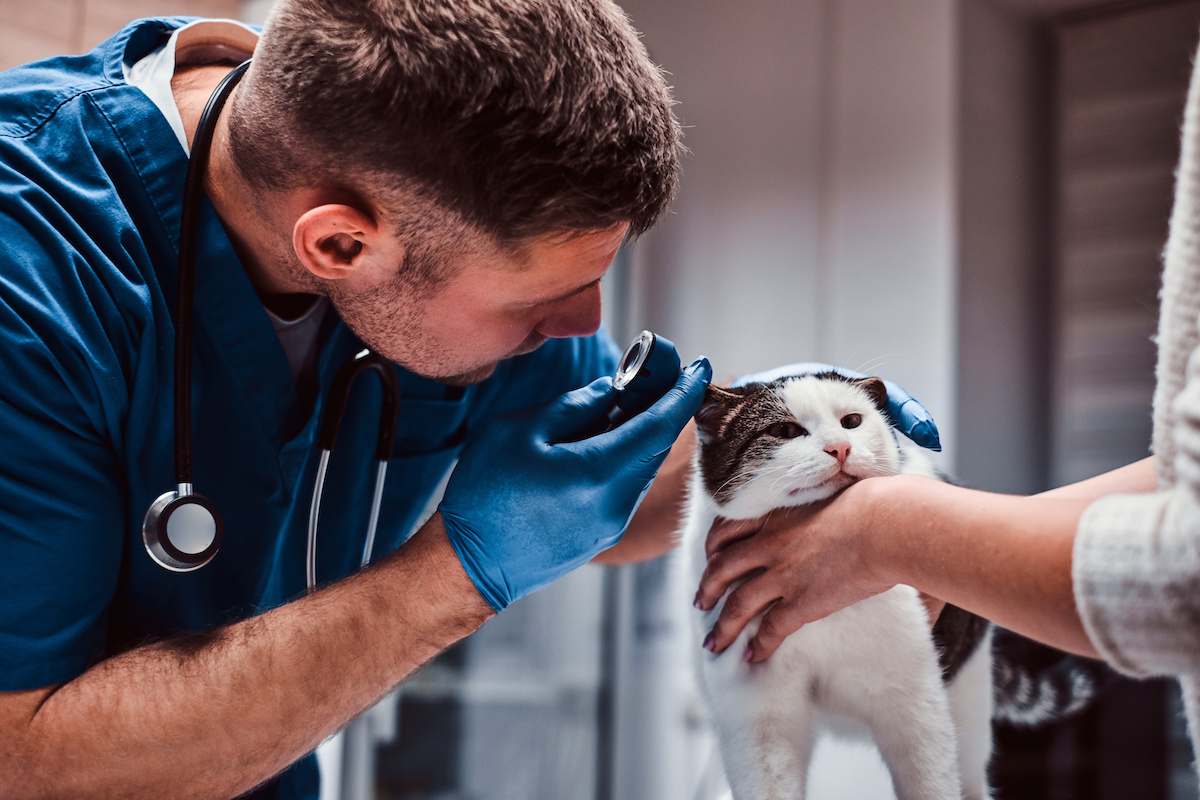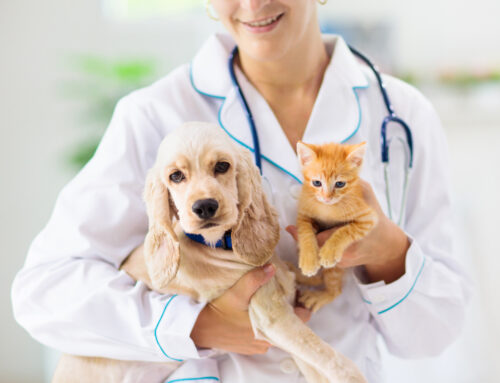Having a companion animal like a cat or a dog, it is commonplace to take them to the local veterinarian clinic when they are feeling sick. But what happens when you have a more exotic animal, say a ferret or a guinea pig? What if you have a horse or a cow that gets sick? There are different types of veterinarians that specialize in specific animals. You typically would not bring a large draft horse to the local veterinarian clinic when it gets sick, so what do you do?
Depending on the type of pad that you have, different veterinary care may be required. When most people think of a veterinarian, they think of veterinarians who assist companion animals such as cats or dogs. This is one very common specialization for veterinarians, but let’s discuss all the specializations and the type of animals they treat.
Where do Veterinarians Work?
You already know that a veterinarian is a professional who works with animals, tending to their health-related needs. But where do veterinarians work?
Veterinarians are employed and a surprising amount of places. You’ll find them working in the following areas:
- Veterinary clinics
- Educational institutions
- Zoos and aquariums
- Ranches and farming businesses
- Government agencies
- Pharmaceutical companies
- Veterinary hospitals
As you can see, veterinarians work at a very large variety of places. But each of these places may require a different specialization of veterinarians. Below, you will find the different types of veterinarians that you may encounter.
Companion Animal Veterinarians
When it comes to companion animal veterinarians, think of them as general practitioners, except for animals. Companion animal veterinarians are the most popular segment of the veterinarian specialization. In fact, according to the American veterinary medical Association, nearly 75% of all veterinarians and private practices work almost exclusively with companion animals.
In other words, it is much more common and easier to find a companion animal veterinarian than an exotic animal veterinarian.
Otherwise known as small animal veterinarians, you will find companion animal veterinarians working at local veterinary clinics and hospitals. They have a variety of tasks that they tend to do each day. The typical day of a companion animal veterinarian includes diagnosing diseases, administering medication, performing surgery, setting broken bones, and euthanizing pets that are terminally ill.
Veterinarians also work on-call 24 hours a day, as they are prepared for emergencies and settings such as animal hospitals. Companion animal veterinarians also clean companion animal teeth and can even assist with the birthing process.
Some veterinarians also own and work in their own practices. This makes some veterinarians business owners as well as a doctor. They also have to work hard to lead the team, which consists of veterinary technicians and much more.
Veterinary specialists
This is where the world of veterinary practice takes a deep dive. There are more than 20 different kinds of veterinary specialties that fall under the veterinary specialist category. There are many career options available in interesting fields. Think of a veterinary specialist as a professional who focuses on one specific area, such as a cardiologist or pediatrician.
These are a few of the veterinary specialist areas, along with brief descriptions.
Anesthesia veterinary specialist
This specialist assesses anesthetic risks of pets of all types. They also assist with the delivery of anesthesia as well as analgesic drugs. Anesthesia veterinary specialists maintain and monitor for the wall being of patients, ensuring that patient vitals remain as expected while caring for their pain levels.
Animal welfare
Veterinarians who specialize in this area work to ensure good animal welfare is recognized. These veterinarians are uniquely qualified to work to educate the public, work in general veterinary practices, as well as other areas of concern animal welfare questions and challenges.
Behavior specialist
Just like a psychologist or psychiatrist or humans, there are also behavioral specialists for animals. These veterinarians are trained on the behavioral health of animals. This is achieved through clinical practice, research, and science-based education. A veterinarian behavior specialist addresses how the environment, health, and experience will impact its behavior. These veterinarians are also extensively trained on psychotropic medications, as well as her side effects and interactions to the medications
Dentistry specialist
Yes, animals have dentists too! Veterinary dentistry specialists work much like human dentists. They diagnose and treat any ailments related to dental, oral, or even maxillofacial diseases.
Emergency and critical care
Think about the time that you or a loved one visited the emergency room. Eventually, you will get to see an emergency room doctor during your visit. This is the same when it comes to emergency and critical care for animals. These veterinarians work in emergency rooms and intensive care units. Think of these physicians as working with the sickest of sick animals.
Internal medicine
This is yet another very broad specialty, which essentially includes subspecialties in specific areas. Internal medicine veterinarians typically work in the following areas:
- Cardiology, which is studying the heart, treating conditions of a heart as well as the circulatory system
- Internal medicine, addressing complex medical issues and diseases that affect the body
- Neurology, which involves diagnosing and treating of conditions related to the brain, spinal cord, and other areas of the nervous system
- Oncology, which is a veterinary specialist who works with cancer patients
Veterinary nutrition
Just like you can go see a nutritionist or dietitian, there is a specialization for this in the world of veterinary care as well. A veterinary nutritionist takes care of the research as well as application in terms of nutrition and diet for your pet, all are relating to health and disease prevention.
Ophthalmology Veterinarian
When you are having trouble seeing, you go to the eye doctor to get glasses. While your pet won’t be wearing glasses, this area specialization serves as the eye doctor for your pet. They study diseases and conditions of the eye.
Radiology
When you break a bone, a radiologist will take an x-ray and evaluate the condition of the bone. Radiology veterinarians work in the same manner. The study areas including ultrasounds, x-rays, MRIs, and many other imaging procedures. There is also a sub-branch of this area, known as radiation all colleges, which help pass with cancer receive treatment by way of radiotherapy.
Surgical veterinarians
There are some veterinarians that exclusively perform surgery, rather than clinical work as cat and dog veterinarians do. There are different groups of surgical veterinarians, including orthopedics, soft tissue, and neurosurgery.
This is just a glimpse into the world of veterinary specialist focuses. There is an astounding amount of specializations that veterinarians may choose to work in. Thankfully we have these professionals working so definitely in a variety of areas, so we can ensure the best health for our pets.
In addition to veterinary specialty areas, another category includes veterinary practitioners.
Veterinary practitioners
With cats and dogs being the most common, there are many different types of veterinary practitioner areas. A practitioner specializes in extensive and advanced training with specific animal species. These species include:
- Avian practice, which are veterinarians dealing with birds
- Equine practice veterinarians, working with horses
- Beef and cattle veterinarians, working with cattle that are raised for meat
- Feline practice
- Canine and feline practice, which is the most common area specialty with veterinarians
- Exotic mammal practice, what’s your veterinarians working with ferrets, mice, rabbits, rats and a variety of other small animals that are kept as pets
- Food animal practice, which is a specialization and working with animals that are used for meat or milk, including cattle, goats, sheep, and pigs
- Dairy practice, which is an area where a veterinarians work with cows that produce milk for human consumption
- Reptile and amphibian practice, which is not the same as exotic animal veterinarians. Exotic animal veterinarians typically only work with mammals, while reptile and amphibian veterinarians work with snakes, lizards, salamanders, turtles, and more.
Just like veterinary specialty areas, there is also a laundry list of veterinary practitioner areas as well.
Zoo Veterinarians
We can’t forget about the big, exotic animals that we find at the zoo. Think about elephants, bears, tigers, and zebras. Who takes care of these animals at the zoo?
This is where you will find a zoo veterinarian. This is a veterinarian specializing in zoological medicine, but they deserve their own category on this blog because of the large variety of zoo collection animals that they work with. They work with free-ranging wildlife as well as aquatic species, and even companion zoological animals.
Zoo veterinarians are incredibly important to the community, as well as our local zoos. They help for the house and well-being of both captive and free-ranging animals. Interestingly enough, the practice of zoo veterinarians is extremely competitive. There are only about a dozen openings each year in the United States to fulfill these positions.
Do you need a veterinarian?
While our office doesn’t provide care for animals such as elephants or jaguars, we can certainly help with your cat and dog companion animals. If you need a reference to a different type of veterinarian, please contact our office to see if we can help. Otherwise, get in touch with us to schedule routine visits, surgeries, more for your cat or dog






